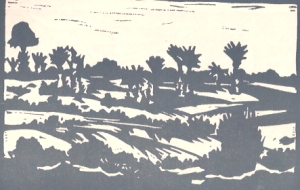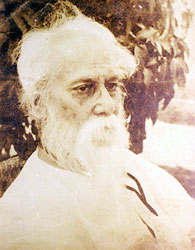The Land Where I Found It All
Buddhadeva Bose
Translated from the original Bangla by
Nandini Gupta
Chapter 9: A Musical Rainbow
[Chapter 1: Earlier memories]
[Chapter 2: Ratan Kuthi and other houses]
[Chapter 3: Holidaying]
[Chapter 4: Summer, rain and children]
[Chapter 5: A solitary madman on a dark night]
[Chapter 6: The land where I found it all]
[Chapter 7: Escape?]
[Chapter 8: Rabindranath and Santiniketan]

Rabindranath turned eighty amidst nationwide celebrations, but under the cloud-cover of a critical illness. We had been told of his painful condition, of the impairment of his senses; we were fearful of meeting him. We thought he would be capable of no more than a few words, we would not have unrestrained access to his bedside. But our fears were quickly dispelled. The first evening he sat outside on the verandah, he looked tired; we could not discern his features clearly in the impending darkness. The next morning, we found him sitting on the covered southern verandah. He wore a yellow robe with a white shirt. A small heap of jasmine flowers lay on a saucer beside him. He had grown lean, his fiery complexion was now dulled, but his fists and wrists were still those of a well-made sturdy man. His shoulder-long mane of hair had been trimmed, but the wavy white hair parted in the middle still looked beautiful. Only, his penetrating glance seemed to have lost its edge; instead there was in his eyes a kindliness. He no longer reminded one of a Mughal badshah, but rather of Tolstoy after eighty. We gazed enraptured at this gloriously handsome man, as at a sculpture. Rabindranath had never been so handsome, it had needed the ravages of age and illness to bring forth this grace. Bernard Shaw once wrote a poem on Ellen Terry's birthday saying how strange it was that every year they aged and Ellen got younger. Rabindranath certainly grew more handsome with age, his photographs through the years bear ample testimony to the fact. Even a while ago, his face radiated an intense luminosity that dazzled eyes, and in large gatherings others dulled in comparison. That too had been beauty, but today his gaunt face held a twilight softness, his eyes glowed with a wistfulness; this was the culmination of his beauty.
 Chattopadhyay |
We visited him, listened to him and everyday when we left, we realised anew that we were blessed. His discourses were colourful outpourings of music, a veritable musical rainbow. They were charming to listen to, as much as they enraptured the mind. It is impossible to gauge his supreme mastery over the Bengali language without hearing him speak thus. His language was the prose of his latest books, he surpassed all the characters of his stories in being able to put the ordinary startlingly; idioms and metaphors blossomed like flowers in his speech, and at sudden unexpected moments came the spark of humour. His flawless beautiful voice with its golden timbre, his clear enunciation, the bold yet mellifluous accent were all familiar; spoken by him, Bengali became so much more forceful and sweeter. His welcome, his cordiality are unforgettable. We were always a little hesitant that we might be overstaying, that we were in the way of his work or rest. Whenever he paused, we thought to leave. But then he would go on to speak about something else, one thing after another—people said that he had never spoken so long and so well. When he was with someone, he gave him his full attention, it was against his nature to be unmindful or unresponsive in anyone's presence. He might speak for only a couple of minutes, but it would be a complete conversation—he never made you feel that he was a supremely busy person, and his time was precious. Annadashankar once wrote that with Rabindranath one always felt that he had all the time in the world, that he had nothing better to do. That is so true. He never hustled, the hurly-burly of this mad world did not touch him; his life was one of unending leisure in the middle of endless work. When he talked to someone, he made it appear to be the one thing that needed his attention. There are people who, in comparison, do much less and lesser work, but who drive themselves and others insane with their breathlessness. I have heard that one has to go through a lot of trouble to be able to meet even an inconsequential European writer, and yet to Rabindranath there was unmitigated access, his doors were always open. All kinds of people came from all over the world to meet him, and almost no one was turned away; people came to him with all kinds of demands, and he tried his best to satisfy them. Till a few days ago, he answered every letter himself, copied out manuscripts to be sent for publication. How he managed to mingle so much leisure with so much work will remain a mystery.
When we visited, Rabindranatah lived in one of the southernly rooms on the ground floor of Udayan. After his illness he had become susceptible to heat, so an air conditioner had been installed in his bedroom. The room was not large. On one side a long table stood against the wall with its rows of medicine bottles, tonics, glasses. There was a bed, an armchair, some books in a small bookcase, and a few leather-stuffed cane stools for visitors. On the walls hung a couple of his own pictures, the picture of a horse by the Chinese artist Ju Peon, and a Japanese cloud-filled landscape. Beside it, there was another smaller room. The whole world: all the world's mountains vistas oceans and cities, all life's togetherness and loneliness, today, for the poet was confined within these two rooms and the two verandahs on the sides.
Illustration: Paruldangar Pathe (On the road to Paruldanga), by Shri Martanda Joshi; taken from Sudhiranjan Das's Amader Shantiniketan.
Published May 9, 2010; 25 Boishakh, 1417
Send us your feedback
©Parabaas, 2010
